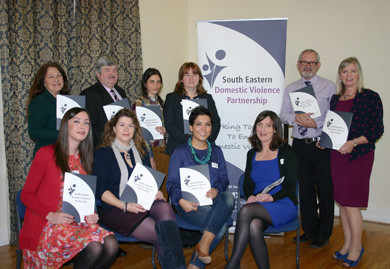AT a meeting organised by the South Eastern Domestic Violence Partnership funded through the European Union’s Peace III Programme, social workers, health professionals and representatives from voluntary and community groups gathered in Ards Arts Centre, Town Hall, Newtownards, to examine how to support families from black and minority ethnic communities who are experiencing domestic violence.
Patricia McMurray, who co-ordinates the South Eastern Domestic Violence Partnership, pointed out that whilst individuals from all groups in society can suffer domestic violence and abuse, black and minority ethnic families can face extra problems. She said: “They may find it difficult to seek help due to actual or perceived discrimination and increased isolation, cultural factors and language difficulties may also be significant barriers to seeking help and advice.”
[caption id="attachment_43848" align="alignleft" width="390"] At the meeting were, front (l-r) Claire Hamilton (NIH&SC Interpreting Service); Susan Thompson (Equality Manager, South Eastern HSC Trust); Marta Fojut (Barnardo’s Tuar Ceatha Services); Patricia McMurray (South Eastern HSC Trust).
At the meeting were, front (l-r) Claire Hamilton (NIH&SC Interpreting Service); Susan Thompson (Equality Manager, South Eastern HSC Trust); Marta Fojut (Barnardo’s Tuar Ceatha Services); Patricia McMurray (South Eastern HSC Trust). Back row, Beth Scott (ND& Ards Women’s Aid); Alderman Robert Gibson (Chairman of the Peace III Partnership); Sophie Romantzoff (NICEM); Sheila Simons (South Eastern Domestic Violence Partnership Chairperson); Jim Murdock (Good Relations Officer, Ards Borough Council); Joan McGovern (Barnardo’s Tuar Ceatha Services).[/caption]
Sophie Romantzoff of the Northern Ireland Council for Ethnic Minorities highlighted the fact that “minority ethnic women often do not receive the support they so desperately need in domestic violence situations. The need for specialised services is one of the key recommendations from NICEM’s research on minority ethnic victim-survivors of domestic violence, which was echoed by the Committee on the Elimination of Discrimination Against Women this summer.”
She added: “This seminar is an opportunity for service providers and community organisations to continue working for the protection of minority women’s rights in situations of violence, and to press for the establishment of specialist services to meet their needs.”
Sheila Simons, from the South Eastern Trust, stressed that domestic violence can result in serious psychological and physical harm, not only to the victim, but also to his or her family. She said: “Children are often the invisible victims as domestic violence can have a devastating impact on children, affecting their health, wellbeing and development, as well as their educational achievements. Early intervention and prevention is crucial in order to safeguard children effectively.”
And Eileen Chan Hu, from the Chinese Welfare Association NI, said “Victims quite often need to access a variety of services, from housing, legal help, education, and counselling as well as our services, therefore, initiatives like this which promote interagency working and raise awareness of the services are to be welcomed “
Speakers included PSNI, South Eastern Health and Social Care Trust, NICEM, Bryson Intercultural Resource Centre, NI Interpreting Service, Chinese Welfare Association, Barnardos and North Down and Ards Women’s Aid.
]]>






















